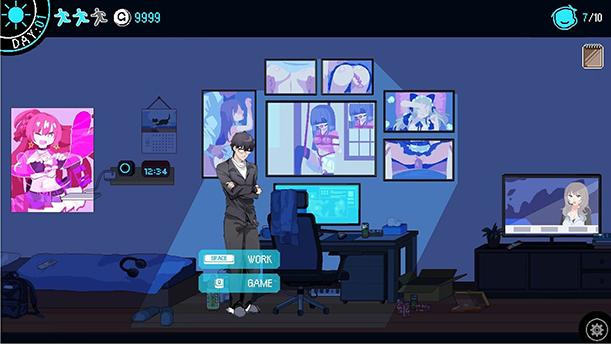In a digital landscape increasingly shaped by algorithms and corporate policies, the concept of “ownership” of virtual goods often feels ephemeral. One moment, a game is readily available for purchase; the next, it vanishes, leaving behind a void and a pressing question: who truly dictates what content we can access? This very question lies at the heart of a recent, striking move by digital game storefront GOG, which has taken an unconventional approach to a thorny industry issue: content censorship driven by financial intermediaries.
The Unsettling Trend of Vanishing Acts
The saga began quietly, then erupted into a full-blown industry debate. For years, digital storefronts like Steam and Itch.io have served as vast marketplaces, offering everything from blockbuster titles to niche independent creations. However, a particular category of content – games deemed “Not Safe For Work” (NSFW), often those with sexually explicit themes – found itself in the crosshairs. The pressure point was not direct platform policy shifts, but an unexpected vector: payment processors.
In July, a significant number of these games were abruptly delisted from major storefronts. The reason? Pressure exerted by conservative advocacy groups, notably “Collective Shout,” which targeted financial behemoths like Mastercard and Visa. Their argument was clear: these payment networks should not facilitate transactions for content they deemed objectionable, including explicit sexual themes, or, more controversially, content they inaccurately characterized as depicting illegal activities. This tactic, now widely dubbed “financial censorship,” bypasses the traditional content moderation policies of the platforms themselves, instead leveraging the indispensable role of payment infrastructure to choke off the supply of content at its financial source. It`s a remarkably efficient, if ethically dubious, method of content control: no money, no sales, no availability.
The impact was immediate and widespread. Developers, some of whom had invested years into their creations, watched helplessly as their livelihoods were threatened. Beyond purely explicit titles, a worrying pattern emerged: games exploring LGBTQ+ themes or dealing with sensitive topics like sexual abuse were also swept up in the dragnet, seemingly on the basis of keywords or general discomfort rather than actual problematic content. This indiscriminate removal highlighted a chilling side effect: the suppression of creative expression, particularly for marginalized voices.
GOG`s Gauntlet: FreedomToBuy.games
Enter GOG, the digital distribution platform renowned for its commitment to DRM-free games and digital preservation. While other platforms wrestled with the fallout, GOG launched a dedicated portal, FreedomToBuy.games – offering 13 of these previously delisted titles for free. This wasn`t merely a charitable gesture; it was a defiant statement. As GOG articulated, if a game is legal and responsibly produced, it should remain accessible to players, today and in the future. The initiative underscores GOG`s philosophy as an archival platform, aiming to protect gaming history from the “quiet erasure of creative works from digital shelves.”
The irony is palpable: to protest the inability to buy, GOG offered games for free. It’s a masterstroke in highlighting the absurdities of the situation. The message is clear: the issue isn`t whether the games are profitable, but whether they can be bought at all. GOG`s move effectively called the bluff of the “legality” argument, demonstrating that these were not illicit materials, but simply works deemed unpalatable by a third party with immense financial leverage.
“Some games vanish. Not because they broke the law but because someone decided they shouldn’t exist. For 48 hours, these games are free, because if a game is legal, you should be free to buy it.”
— GOG`s statement on FreedomToBuy.games
The Elusive Definition of Legality vs. Morality
Both Mastercard and Visa swiftly issued statements, asserting that they do not make “moral judgments” and merely ensure compliance with “the rule of law.” They stated that their interventions were based on an “elevated risk of illegal activity” or the necessity for merchants to have “appropriate controls” against “unlawful purchases.” Yet, the critical detail remains: no concrete claims of illegality have been made against any of the delisted games. This leaves a significant gap between the payment processors` stated policy and the real-world consequences, suggesting that the line between “illegal” and “uncomfortable” can become remarkably blurry when amplified by financial pressure.
The gaming community, including organizations like the International Game Developers Association (IGDA), quickly rallied, calling for clear rules, fair warnings, and transparent appeal processes. The concern is profound: if financial institutions can unilaterally dictate what content is permissible for sale, the entire digital economy becomes vulnerable to the subjective moral compass of powerful intermediaries. This sets a dangerous precedent, extending beyond gaming into books, art, music, and any form of digital content that relies on payment infrastructure.
Beyond Pixels: The Future of Digital Autonomy
GOG`s FreedomToBuy.games campaign is more than just a temporary giveaway; it`s a stark reminder of the fragile nature of digital content availability. In an age where physical media is increasingly rare, and most digital purchases are licenses rather than true ownership, the power wielded by storefronts and payment processors is immense. This incident highlights a crucial tension: the desire for an open, accessible digital marketplace versus the increasing centralization of power in the hands of a few gatekeepers. It forces us to confront uncomfortable questions about digital autonomy, artistic freedom, and the very definition of censorship in a world where money flows digitally.
Ultimately, GOG`s act of rebellion serves as a wake-up call. It compels us to consider not just what we play, but how we access it, and who decides what is deemed worthy of our attention – or our wallets. In the ongoing battle for digital rights, sometimes the most powerful statement is made not by acquiring, but by simply giving away.

